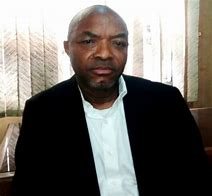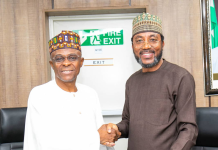*Pick Holes in NCS High Revenues amidst Poor Cargo Importation
Mr. Bolaji Sunmola has been elected as the new Chairman of the Nigerian Ports Consultative Council (NPCC).
Maritime Bits checks revealed that since the demise of the late Chairman of NPCC, Otunba Kunle Folarin on November 8, 2022, there has been leadership vacuum in the organization which drew its membership from critical stakeholders.
With his successful election, Sunmola has succeeded Folarin whose deep knowledge of the maritime industry was legendary.
The election of Folarin’s successor took place at NPCC quarterly meeting at Federal Palace Hotel, Victoria Island, Lagos recently.
Besides the election, the NPCC used the occasion of its meeting to review the port performance report from January to December 2023.
It observed that there has been a reduction in level of cargo importation into the country. It picked holes in the revenue generated by the Nigeria Customs Service (NCS) amidst increase cargo importation.
It wondered how the NCS was able to meet its 2023 revenue target low cargo importation into the country.
Maritime Bits gathered that the port performance report was based on submissions by the Nigerian Ports Authority (NPA) General Manager, Security; NPA General Manager, Corporate and Strategic Planning; Commissioner of Police, Western Ports; Chairman, National Industrial Safety Council of Nigeria and the Chairman, Port Operations and Logistics Committee, NPCC, Captain Iheanacho Ebubeogu.
Participants at the meeting did not only delved into the challenges of the Nigerian port industry but also proffered solutions.
From the report, no fewer than 3,778 ships berthed at all Nigerian ports in 2023 as against 3,957 that berthed in 2022, showing a decrease of 4.5%. The gross tonnage of ships completed was 122,873,684 as against 120,368,153 gross tonnage in 2022, showing an increase of 2.1%.
While inward cargo throughput (excluding oil) in the year under review stood at 70,475,671metric tons as against 75,274,843 metric tons in 2022, indicating a decline of 6.4 percent, inward cargo traffic stood at 46,378,186 metric tons representing 65.8% of cargo throughput in 2023. Outward cargo traffic was 24,097,485 metric tons representing 34.2% of total cargo traffic.
Also, container traffic during the period under review stood at 1,566,162 TEUs, showing a decrease of 6.8% from 1,681,328 TEUs handled in 2022. Import container traffic accounted for 55.85% with 874,683 TEUs while export container traffic stood at 684,586 TEUs representing 43.71% of total container traffic. Empty containers accounted for about 80% of total export container traffic.
A total of 132,296 units of vehicles were handled during the period under review, indicating a decrease of 32% from 194,550 units in 2022. Average turn-around time of vessels was 4.0 days compared with 5.2 days in 2022. This was made possible by the impact of the Lekki Deep Seaport which achieved average turn-around time of only one day. Berth occupancy rate stood at 32.0% as against 36.6% in 2022.
The Commissioner of Police report dwelt extensively on the challenges of a recalcitrant set of drivers and motor boys. Two drivers were said to have killed two motor boys during the period under review.
The Chairman, National Industrial Safety Council dwelt on the need for special training and licensing of truck drivers to ensure port Industry safety. He compared drivers of expensive trucks to pilots of expensive airplanes to emphasize the need for special training of port truck drivers.
The report submitted by the Chairman, Port Operations and Logistics Committee, NPCC identified the need to redesign the port perimeter limits of Apapa and Tin Can Island Ports to ameliorate the operational problems encountered within the maritime sector.
He dealt in details with the issues of the railway crossing at dockyard, the terrible shape of the roads leading to and out of Ijora and the need to fix them urgently for operational and safety demands.
He drew the attention of participants at the meeting to the impassable state of Mile Two Apapa Oshodi Expressway now turned to private truck parks, the dirt generated by commercial food sellers and the consequences, damage to the metal sheet wires barricading the expressway, influx of non-state actors who sell all manner of fuel along the road,
He emphasized the need for port planning, strategic port land planning, port Master plan, port maritime logistics ring, port rehabilitation and modernization, and the need for electoral, administrative, and constitutional reform of the Nigerian ports consultative council in line with global best practices. He also emphasized the need for budgetary provisions to strengthen the council.
The summary as it affects the Nigerian port industry stakeholders is that there has been continuous decline of cargo import and export due mainly to global economic recession, COVID-19 pandemic, anti-trade policies of the NIgerian Government, human factors, etc. For example, the Nigerian ports received a total of more than 14,000,000 ton equivalent units in 2014. In 2023, it nosedived to 1,566,162 TEUs.
According to NPCC, year 2024 holds out little hope for international trade in Nigeria. It however averred that the Federal Government can assuage the stakeholders’ fears through deliberate fiscal policies aimed at reviving the Nigerian trade Industry. Unless this is done, the Nigerian port industry can only start recovering from 2026.











